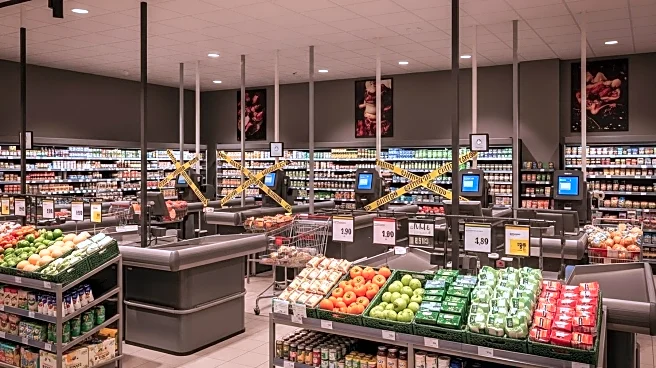What's Happening?
Albertsons has announced the suspension of its self-checkout lanes in Long Beach, California, following the implementation of a new city ordinance. The ordinance, identified as 25-0010, imposes restrictions on self-checkout operations, including a ban on purchasing locked or secured items through these lanes. As a result, Albertsons has closed self-checkout stations in four Vons stores, which are owned by the company. The ordinance also mandates that one supermarket staffer must supervise three self-checkout stations. This move comes amid concerns over rising petty theft, which reportedly increased by 16% between 2023 and 2024. Other retailers, such as Walmart and Target, have also been adjusting their self-checkout policies to address similar issues.
Why It's Important?
The suspension of self-checkout lanes at Albertsons highlights the ongoing challenges retailers face in balancing convenience with security. Self-checkout systems have been popular for their efficiency, but they also pose risks of increased theft. The new ordinance in Long Beach reflects a broader trend among retailers to tighten security measures and reduce losses from shoplifting. This development could influence other cities and retailers to adopt similar policies, potentially affecting consumer shopping experiences and store operations nationwide. Retailers may need to invest more in staff supervision and technology to ensure compliance and security.
What's Next?
Albertsons and other affected retailers will likely monitor the impact of the ordinance on store operations and customer satisfaction. Adjustments to staffing and checkout processes may be necessary to accommodate the new requirements. Retailers might explore technological solutions to enhance security and efficiency at self-checkout stations. Additionally, other cities may consider similar ordinances if the Long Beach policy proves effective in reducing theft. The retail industry will need to balance these security measures with maintaining customer convenience and satisfaction.
Beyond the Headlines
The changes in self-checkout policies could have broader implications for the retail industry, including shifts in consumer behavior and expectations. As retailers implement stricter security measures, customers may experience longer wait times and reduced convenience, potentially impacting store loyalty and sales. The focus on security might also drive innovation in checkout technology, leading to new systems that better address theft concerns while maintaining efficiency. These developments could reshape the future of retail operations and customer interactions.









